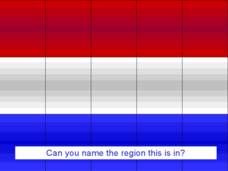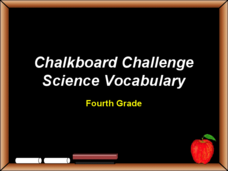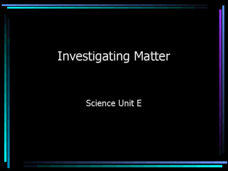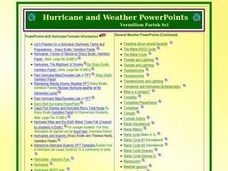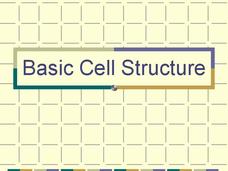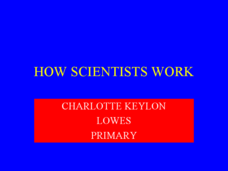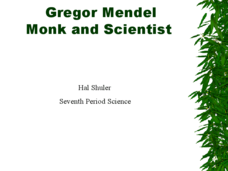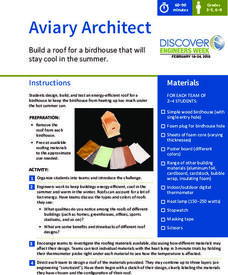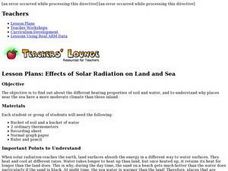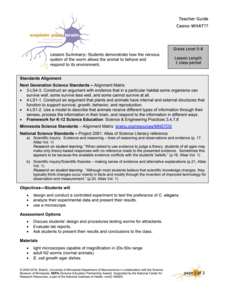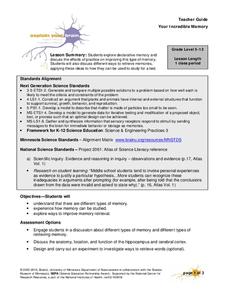Curated OER
Winter Wonderland Activities
Ideas to help keep the motivational fire in your classroom burning.
Curated OER
The Everglades
Can your students recognize the Everglades? Test their knowledge with this puzzling PowerPoint. A photo of the Everglades is slowly uncovered as you flip through the slides. Tip: Use this as a hook prior to a new lesson!
Curated OER
Planets on Parade
Review all of the planets in our solar system with this informative PowerPoint. Each planet is listed on its own slide, accompanied by facts and an image. There are three multiple choice question listed at the end of the presentation.
Curated OER
Chalkboard Challenge: Science Vocabulary
Review science vocabulary with your students using this Jeopardy-style PowerPoint. Categories for this game include: Solar System, Plants, Weather, Cells, and Rocks. There are a total of 25 clues; five for each category.
Curated OER
Jeopardy: Science
Need a science activity for a rainy day? This Jeopardy game is a perfect way to keep students entertained while they are stuck inside for recess. The five categories are: Things that Grow, Animals, Geology, Weather, and It's Electric....
Curated OER
Investigating Matter
What a great resource! This presentation is informative as is, but there are links provided to some great resources that can help learners explore the states of matter in greater depth. For example, there is a link to a website that...
Curated OER
Hurricane and Weather Power Points
Providing a wealth of information about hurricanes, tornadoes, and other types of weather-related events, this resource could be used in the classroom in a variety of ways. A teacher could use the PowerPoints listed as a way to introduce...
Curated OER
Basic Cell Structure
Initially, general details about cells and single cell organisms are provided. Next, the concentration becomes cellular processes such as respiration, osmosis, diffusion, fission and mitosis. This is an attractive PowerPoint which gives...
Curated OER
How Scientists Work
The arsenal of tools a scientist uses to observe the world are varied. This great presentation gives students a look at some of the strategies they should use when looking at the world around them. The information can be used as a...
Curated OER
Jeopardy Game - Science
Used in an upper elementary classroom, this presentation could be a center activity or a whole-group experience. This is a great way to review a variety of scientific topics. There are questions relating to the planets, rock formations,...
Curated OER
Celebrating Groundhog Day with your Students
Celebrating Groundhog Day in your classroom is a fun-filled way to explore science, art, and literature.
Curated OER
Chalkboard Challenge: Science Vocabulary
Students play a Jeopary-style game in this engaging PowerPoint. The scientific categories are the solar system, planet, weather, cells, and rocks. These types of interactive games are an excellent way to reinforce the important...
Curated OER
Gregor Mendel: Monk and Scientist
This is a visually attractive PowerPoint that summarizes the life of Gregor Mendel and the genetic traits that he detailed. Each slide has clear bullet points and lovely images that are helpful and relevant
DiscoverE
Aviary Architect
New ReviewGroups of two to four work collaboratively to engineer a birdhouse that will stay cool in the summer heat. Teams examine several different-colored roofs, testing the efficiency of each with a heat lamp. Then, groups sketch their ideas,...
US Department of Energy
Effects of Solar Radiation on Land and Sea
Earth science enthusiasts experiment to compare the heating rates of soil and water. They relate their findings to the weather conditions near bodies of water. Consider also having middle schoolers measure the cooling rates to...
Biology Junction
Cells and Their Organelles
This series of handouts and images asks young scientists to read short informational paragraphs, answer identification questions, and color and label diagrams of animal and plant cells. This is a complete resource that could be given as...
University of Minnesota
Caeno-WHAT??
Can you feel that? Can you smell that? Since pupils can't ask worms about their sense of smell and touch, they design and complete an experiment to answer these questions. Individuals expose nematodes to different stimuli using their...
University of Minnesota
Inquiry Cubes
How do you teach kids to "science" effectively? Inquiry cubes are a "sort of" puzzle with no answer—promoting even more questions! Group members work together to use the evidence on the visible sides of each cube to infer what lies on...
University of Minnesota
Motor Learning and Memory
What do our brains have to do with reaction timing? Everything! In a hands-on learning activity, young scientists participate in four card activities that measure reaction timing. Each activity gets progressively more complex, and...
University of Minnesota
Close-up of the Nervous System
Make sure your class gets on your nerves! Learners of all ages practice peering into the nervous system to see what's inside. Groups examine prepared slides of mammalian nervous system tissues, all while gaining microscope skills. The...
University of Minnesota
Your Incredible Memory
Test the efficiency of your memory! Scholars test each other's memory as they explore factors that affect memory retrieval. Through experimental analysis, they discover there are different types of memory, which has an impact on the...
University of Minnesota
Bead Neuron
What do you call a skull without neurons? A no-brainer! A hands-on activity asks scholars to build a model of a neuron using beads. They use their models to study the parts of the neuron and their functions.
University of Minnesota
C. elegans and Alcohol
Investigate experimental design through a hands-on exploration. A creative lesson plan allows learners to design an experiment to monitor the effects of alcohol on the C. elegans worm. After conducting the experiment, individuals analyze...
University of Minnesota
Whose Choice Is It Anyway?
Your taste buds may be saying Pepsi, but your brain is saying Coke! By analyzing experimental research, learners discover ways in which our brains impact decision making. They conclude with a discussion of neuromarketing and how it...



